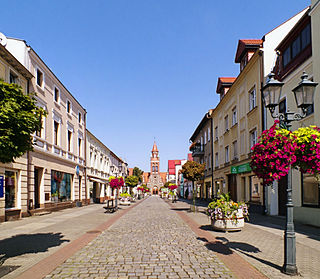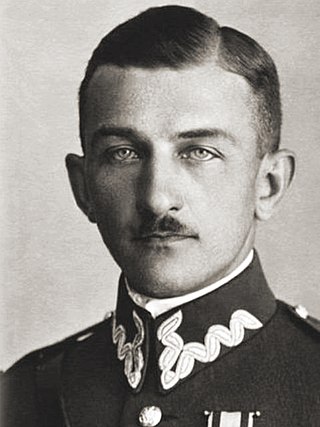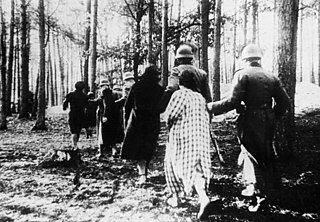Related Research Articles

Westerplatte is a peninsula in Gdańsk, Poland, located on the Baltic Sea coast mouth of the Dead Vistula, in the Gdańsk harbour channel. From 1926 to 1939, it was the location of a Polish Military Transit Depot (WST), sanctioned within the territory of the Free City of Danzig.

Jarocin is a town in west-central Poland with 25,700 inhabitants (1995), the administrative capital of Jarocin County in Greater Poland Voivodeship.

Krotoszyn is a town in west-central Poland with 29,485 inhabitants as of 2010. It is the seat of Krotoszyn County in the Greater Poland Voivodeship.

Mogilno is a town in central Poland, seat of the Mogilno County in the Kuyavian-Pomeranian Voivodeship.

Grodzisk Wielkopolski is a town in western Poland, in Greater Poland Voivodeship (Wielkopolskie), with a population of 13,703 (2006). It is 43 kilometres (27 mi) south-west of Poznań, the voivodeship capital. It is the seat of Grodzisk Wielkopolski County, and also of the smaller administrative district called Gmina Grodzisk Wielkopolski. It is situated on the Letnica River. The suffix "Wielkopolski" distinguishes it from the town of Grodzisk Mazowiecki in east-central Poland.

Karol Wacław Świerczewski was a Polish and Soviet Red Army general and statesman. He was a Bolshevik Party member during the Russian Civil War and a Soviet officer in the wars fought abroad by the Soviet Union including the one against Polish as well as Ukrainian Republics and in Republican Spain. In 1939 he participated in the Soviet invasion of Poland again. At the end of World War II in Europe he was installed as one of leaders of the Soviet-sponsored Polish Provisional Government of National Unity. Soon later, Świerczewski died in a country-road ambush shot by the militants from OUN-UPA. He was an icon of communist propaganda for the following several decades.
Movement for Defence of Human and Civic Rights was a right-wing political and social organization formed in People's Republic of Poland in March 1977. It tried to resist the regime by denouncing it for violating Polish and international laws including the Constitution of the People's Republic of Poland and International Covenant on Civil and Political Rights.

The 7th Infantry Division was the name of several units of the Polish Army.

Jan Józef Lipski was a Polish critic, literature historian, politician and freemason. As a soldier of the Home Army, he fought in the Warsaw Uprising. Editor of collected works by Jan Kasprowicz, Benedykt Chmielowski and Gabriela Zapolska.

Kłecko is a town in Gniezno County, Greater Poland Voivodeship, Poland, with 2,632 inhabitants (2010).

The Ciepielów massacre that took place on 8 September 1939 was one of the largest and most documented war crimes of the Wehrmacht during its invasion of Poland. On that day, the forest near Ciepielów was the site of a mass murder of Polish prisoners of war from the Polish Upper Silesian 74th Infantry Regiment. The massacre was carried out by soldiers from the German Army's 15th Motorized Infantry Regiment, 29th Motorized Infantry Division, under the command of Colonel Walter Wessel.

Tadeusz Klimecki – Brigadier General of the Polish Army, Chief of Polish General Staff.

Antoni Wysocki was a Polish military commander. He was a member of the Greater Poland Uprising, the commander of the Wilda military campaign, which was the first to reach the Bazar Hotel on the day of the outbreak of the insurrection.

The Palmiry massacre was a series of mass executions carried out by Nazi German forces, during World War II, near the village of Palmiry in the Kampinos Forest northwest of Warsaw.

Józef Berkowicz also known as Joseph Berkovitz or Berkowitz was a Polish military officer of Jewish origin, the only son of Berek Joselewicz.

The Katowice massacre or the Bloody Monday in Katowice that took place on 4 September 1939 was one of the largest war crimes of the Wehrmacht during its invasion of Poland. On that day, German Wehrmacht soldiers aided by the Freikorps militia executed about 80 of the Polish defenders of the city. Those defenders were self-defense militia volunteers, including former Silesian Insurgents, Polish Boy and Girl Scouts, and possibly a number of Polish soldier stragglers from retreating Polish regular forces who joined the militia.

The Defense of Katowice was carried out by small groups of irregular Polish militia on 3–4 September 1939 during the German invasion of Poland. German troops secured the city by the end of 4 September.

Józef Władysław Walaszczyk was a Polish leatherworker and businessman who was declared Righteous Among the Nations in 2002 for sheltering Jews during the Holocaust. He has been described as a "second Schindler" or "Polish Schindler".

Bernard Stanisław Śliwiński (1883-1941) was a Polish doctor of law, insurgent during the Greater Poland uprising, Lieutenant colonel in the Polish Armed Forces infantry, district commander of the state police, Mayor of Bydgoszcz and recipient of the Knight's Cross of the Order of Virtuti Militari.
References
- 1 2 "Karol Szwedowski – najstarszy Westerplatczyk". legionowo.pl (in Polish).
- ↑ "Legionowo. Karol Szwedowski, najstarszy cywilny obrońca Westerplatte ma swoją tablicę pamiątkową. Uroczystości jej odsłonięcia odbędą się na cmentarzu parafialnym - Gazeta Powiatowa". gazetapowiatowa.pl (in Polish). 9 September 2022. Retrieved 15 April 2024.
- ↑ Warszawa, Instytut Pamięci Narodowej-. "Uroczyste odsłonięcie tablicy poświęconej Karolowi Szwedowskiemu – uczestnikowi obrony Westerplatte – Legionowo, 12 września 2022". Instytut Pamięci Narodowej - Warszawa (in Polish). Retrieved 15 April 2024.